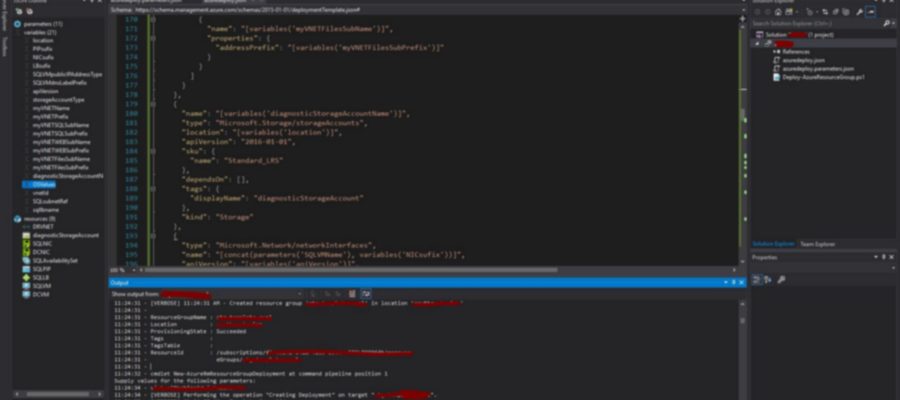Create Azure File Shares at your ARM template using PowerShell
Using Azure Resource Manage template deployment, you can create a Storage account but you cannot create File Shares. Azure File Shares can be created using the Azure Portal, the Azure PowerShell or the Azure Cli.
Mainly, the idea is to run a PowerShell script that will create the File Shares. This script will be invoked inside the ARM Template. In order to use a PowerShell script from a template, the script must be called from a URL. A good way to provide this is using the Git repository. One major thing to consider is the Storage Account key must be provided to the PowerShell script securely, since the PowerShell script is at a public URL.
The PowerShell script will run inside a Virtual Machine and we will use a CustomScriptExtension Extension to provide it. To use this, at the Virtual Machine Resource of the JSON file add a resources section.
The Custom Script Exception is located at the Virtual Machine resource. Lets assume that the last part of the Virtual Machine resource is the “diagnosticsProfile” so after the closure of the “diagnosticsProfile” we can add the “resources”. Inside the “resources” add the “extensions” resource that will add the “CustomScriptExtension”, like below.
The Template Part
This will be the addition at the Virtual Machine resource:
"diagnosticsProfile": {
"bootDiagnostics": {
"enabled": true,
"storageUri": "[concat(reference(concat('Microsoft.Storage/storageAccounts/', variables('diagnosticStorageAccountName')), '2016-01-01').primaryEndpoints.blob)]"
}
}
},
"resources": [
{
"name": "AzureFileShares",
"type": "extensions",
"location": "[variables('location')]",
"apiVersion": "2016-03-30",
"dependsOn": [
"[resourceId('Microsoft.Compute/virtualMachines', parameters('VMName'))]",
"[variables('AzureFilesStorageId')]"
],
"tags": {
"displayName": "AzureFileShares"
},
"properties": {
"publisher": "Microsoft.Compute",
"type": "CustomScriptExtension",
"typeHandlerVersion": "1.4",
"autoUpgradeMinorVersion": true,
"settings": {
"fileUris": [
"https://raw.githubusercontent.com/######/#####/master/azurefiles.ps1"
]
},
"protectedSettings": {
"commandToExecute": "[concat('powershell -ExecutionPolicy Unrestricted -File ','azurefiles.ps1 -SAName ',parameters('AzureFilesStorageName'),' -SAKey ', listKeys(resourceId(variables('AzureFilesStorageAccountResourceGroup'),'Microsoft.Storage/storageAccounts', parameters('AzureFilesStorageName')), '2015-06-15').key1)]"
}
}
}
]
},
The extension must be depended from the Virtual Machine that will run the script and the Storage Account that will bu used for the file shares.
At the custom script properties add the public RAW url of the PowerShell script.
Next lets see the Storage Account key and execution part. At the connandToExecute section, we will provide a variable that will pass the Storage Account key & Name inside the script for execution. The variable will get the Storage Account key from the Storage Account using the permissions of the Account running the Template Deployment.
Of course to make the template more flexible I have added a variable for the Resource Group and a parameter for the AzureFilesStorageName, so the template will ask for the Storage Account name at the parameters.
The PowerShell
The PowerShell script is tested at Windows Server 2016 VM. You can find it below:
Param ( [Parameter()] [String]$SAKey, [String]$SAName ) Install-PackageProvider -Name NuGet -MinimumVersion 2.8.5.201 -Force Set-PSRepository -Name PSGallery -InstallationPolicy Trusted Install-Module Azure -Confirm:$False Import-Module Azure $storageContext = New-AzureStorageContext -StorageAccountName $SAName -StorageAccountKey $SourceSAKey $storageContext | New-AzureStorageShare -Name #####

Pantelis Apostolidis is a Sr. Specialist, Azure at Microsoft and a former Microsoft Azure MVP. For the last 20 years, Pantelis has been involved to major cloud projects in Greece and abroad, helping companies to adopt and deploy cloud technologies, driving business value. He is entitled to a lot of Microsoft Expert Certifications, demonstrating his proven experience in delivering high quality solutions. He is an author, blogger and he is acting as a spokesperson for conferences, workshops and webinars. He is also an active member of several communities as a moderator in azureheads.gr and autoexec.gr. Follow him on Twitter @papostolidis.

